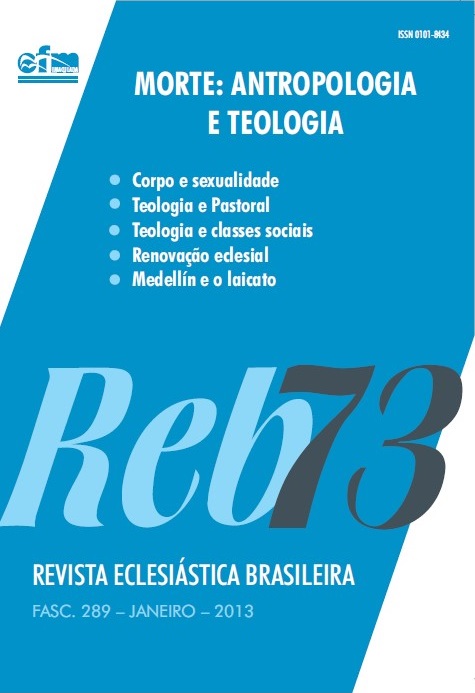Salvar-nos do cinismo: teologia e classes sociais
DOI :
https://doi.org/10.29386/reb.v73i289.683Mots-clés :
Economia, Mercado, Classes sociais, Conflito social, Pecado estrutural, Teologia, Idolatria, Opção pelos pobres.Résumé
A crise econômica que atinge os Estados Unidos e a Europa e a visibilidade mundial dos movimentos “Ocupem” nos Estados Unidos colocaram novamente o tema da desigualdade social em destaque. Geralmente, nas Igrejas e na teologia, esse assunto é objeto de crítica ética utilizando-se o conceito de classes sociais em termos de renda, ricos e pobres. Este artigo defende a tese de que, para superamos o cinismo frente ao sofrimento dos pobres, é preciso ir além: é preciso uma crítica teológica que se liberte do cinismo e trabalhe com a noção de classes sociais, associada ao lugar nas relações sociais de produção, de idolatria e de pecado estrutural.
Abstract: The economic crisis affecting the United States and Europe and the worldwide visibility of the movement “Occupy” in the United States brought the issue of social inequality once more to the fore. Generally, in the Churches and in theology, this matter is the target of ethical criticism where the concept of social classes - in terms of income, the rich and the poor - is used. This article defends the thesis that, in order to overcome cynicism in face of the suffering of the poor, we must go further: we need a theological critique that can free itself from cynicism and work with the notion of social classes associated with the place in the social relations of production and with the notion of idolatry and structural sin.
Keywords: Economics. Market. Social classes. Social conflict. Structural sin. Theology. Idolatry. Option for the poor.
Téléchargements
Publié-e
Comment citer
Numéro
Rubrique
Licence
© Revista Eclesiástica Brasileira 2018

Cette œuvre est sous licence Creative Commons Attribution 4.0 International.
Os autores cedem os direitos autorais; como gratificação, a REB oferece dois exemplares ao Autor de um artigo.
A REB adere à licença não comercial (Creative Commons). Portanto, é permitida cópia, distribuição e exibição dos textos, respeitados os direitos autorais e citada a fonte de sua proveniência.


